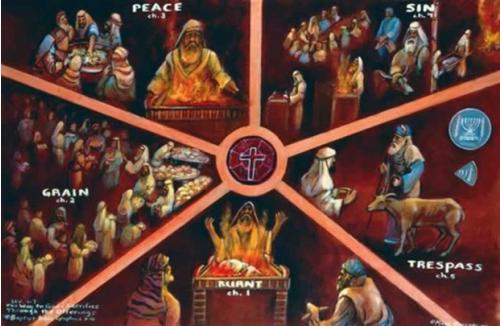The Five Offerings Part 1

Chapters 1 to 7 of Leviticus describe five offerings.
All of them picture Christ and His perfect life and His death. Both being an offering to His Father. God does not want us to think only of Christ's death, but also of His perfect life, because there are some offerings described here in which no blood is shed. Those offerings obviously do not refer to Calvary, but to Jesus' perfect life. That shows that God wants us to think much about His life too. Many Christians think only of the sacrifice Jesus made on the cross. But what we learn from Leviticus is that He made many sacrifices in His life too. He offered His life day by day to His Father, pouring out His own will and His soul-life to death.
Two of theses five offerings were mandatory (compulsory)-the sin offering and the guilt offering. The other three offerings were voluntary-the burnt offering-which is a picture of our offering ourselves totally to God. The burnt offering had to be first cut into pieces to ensure that there was no defect in any part of it-and then it was offered. People could offer a bullock or a sheep or a goat or even a dove or pigeon, according to their financial ability. But each offering had to be without any blemish or defect.
The burnt offering is a picture of the way Jesus presented His body, throughout His earthly life, to His Father-and then finally on the cross as well.
All through His earthly life, He kept His body perfectly pure in every temptation before he presented it to His Father as a sacrifice on the cross. God would not have accepted Jesus' offering up of Himself on the cross if there was a single spot in His earthly life during the previous 33 1/2 years. This was why when He was hungry, He did not turn the stones into bread. That would have been a sin, because the Father had not told Him to do it. His life was one of total dependence and total obedience. Jesus never did anything without the Fathers' prompting, even if it appeared to be a harmless thing like turning stones into bread to satisfy one's hunger! That is the standard of obedience to which God calls us. That is why Jesus' life was so triumphant, and that was why the Father was so delighted with Him.
Consider yet another example: In Luke 4:38-42, we read of a great revival in a town. The next morning, the multitude pressed Jesus to stay on there and to continue the “revival meetings”. But Jesus said, “No.” Why? Because, before He met the people that morning, He had met with His Father in the wilderness and He heard the voice of His Father telling Him to go elsewhere. So, He would yield to the pressure of the multitudes but went where the father told Him to go. If He had yielded to the multitudes and conducted revival meetings, he would have sinned! Have you got such an understanding of sin yet?
How many of us believe that conducting revival meetings or having “Days of recollections”, could be sinful!! That was the level of sensitivity to sin at which Jesus lived. We normally think of sins as things like getting angry, having dirty thoughts, and being jealous or bitter etc. These are also sins-but at a kindergarten level. Jesus was dealing sin at the Doctorate (Ph. D) level. Did you know that if God has not called you to go some place or to do something particular and you do that, you are a sinning?
But we can't reach this Doctorate level overnight! We have to make gradual progress from one class to the next, year by year. As we progress, we will discover that a lot of things we never considered as sin earlier, now become sin for us. When “sin might become sinful above measure. ” (Romans 7:13) We can be certain that we are growing spiritually!
So, when we look at Jesus life, we don't think only of His death at Calvary, but also of His whole life where He presented Himself to the Father fully saying “a body thou has prepared for Me...and I have come to do Thy will O God. (in this body)” (Hebrews 10:5,7). Jesus never once did His own will in his body but only the Father's. This is what it means to offer oneself as a burnt offering to God.







 Follow
Follow

